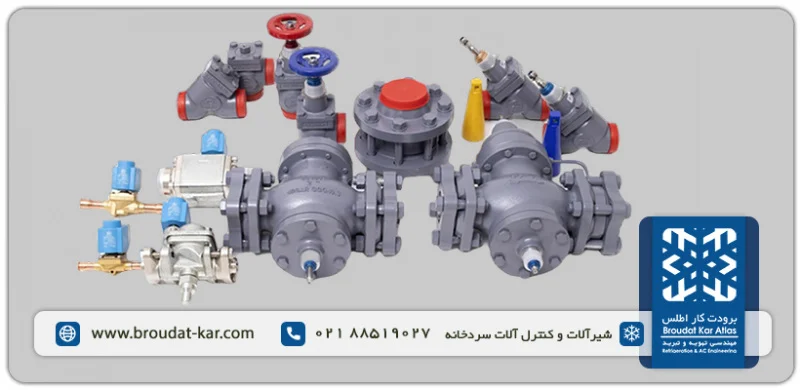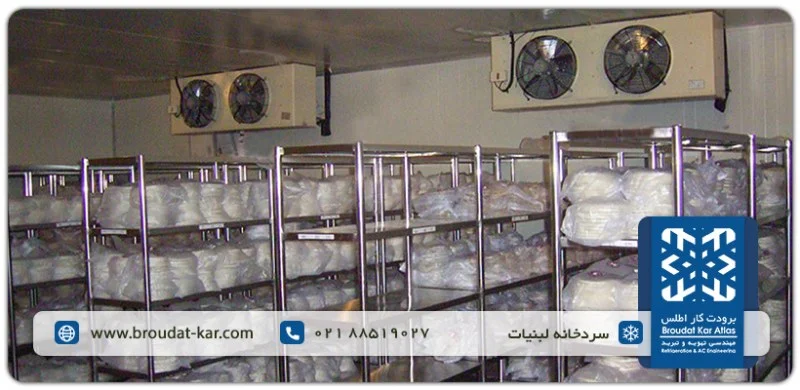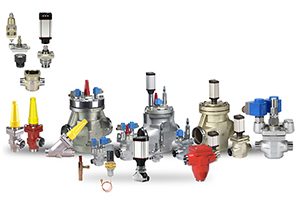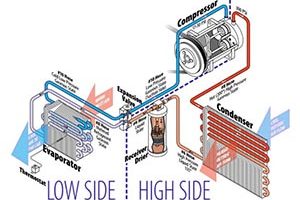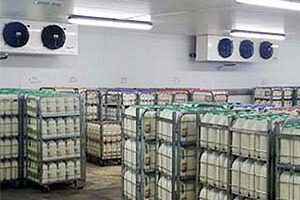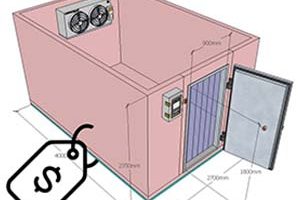What is dairy cold storage?
Dairy cold storage stands as a pivotal element within the dairy industry, crucial for the preservation and safekeeping of dairy products. Here at Atlas Refrigeration Company, we specialize in crafting dependable and efficient solutions tailored specifically to meet the unique demands of the dairy sector. Our dedicated dairy cold storage systems guarantee optimal conditions for preserving dairy items at the most competitive prices achievable
Typically, these units sustain temperatures ranging between -20 to +5 degrees Celsius, necessitating specialized refrigeration equipment for precise temperature and humidity control, all while averting any risk of cross-contamination.
At the heart of each dairy cold storage facility lies its refrigeration system, consisting of essential components such as compressors, evaporators, condensers, and controllers. Working in seamless harmony, these components ensure the maintenance of consistent temperature and humidity levels throughout the storage environment.
A critical component within the dairy refrigeration setup is the Ice Bank—a thermal energy storage system engineered to stabilize temperatures, especially during peak operational periods. By freezing water during off-peak hours, this stored thermal energy supplements the refrigeration system when required, thereby ensuring a steady and reliable cooling environment for dairy products.
Preserving Dairy Freshness: The Significance of Dairy Cold Storage
Dairy products, being highly perishable, require proper storage to prevent rapid spoilage, loss of quality, nutritional degradation, and safety risks. Cold storage plays a pivotal role in maintaining the integrity and safety of dairy products during transportation and storage.
The primary objective of refrigerating dairy products is to inhibit bacterial growth, thereby extending their shelf life. Additionally, cold storage preserves the nutritional content, freshness, flavor, and texture of dairy items, ensuring they remain safe and palatable for consumption.
Preserving Dairy Quality and Safety: The Role of Dairy Cold Storage
Dairy products such as milk, cheese, ice cream, butter, cream, and yogurt are beloved staples worldwide. However, their perishable nature demands meticulous storage to uphold food quality and safety standards. Dairy cold storage stands as a critical element within the dairy supply chain, ensuring that these products are adequately preserved and transported from farm to market. In the ensuing discussion, we delve into the significance of dairy cold storage, explore various types of dairy products, outline optimal storage methods within cold rooms, and also shed light on the pricing considerations associated with dairy cold rooms. Stay tuned for insights into maintaining dairy freshness and safety.
Storing Various Dairy Products in Cold Storage
In a dairy cold storage facility, a variety of dairy products require specialized storage conditions to maintain their quality and safety. These include milk, cheese, butter, yogurt, ice cream, and cream. Each product comes with specific storage requirements crucial for preserving its integrity:
Milk: As a highly perishable product, milk demands storage temperatures between 0 and 4 degrees Celsius to prevent spoilage.
Cheese: The storage temperature for cheese generally ranges between 2 and 7 degrees Celsius. However, specific types like Mozzarella and Cheddar have varying requirements.
Mozzarella cheese or pizza cheese: Stored at -18 degrees Celsius with humidity between 85-90%.
Cheddar cheese: Kept at 0 to +5 degrees Celsius with humidity between 80-85%.
Butter: To maintain its quality and freshness, butter should be stored at temperatures between -18 and -20 degrees Celsius.
Margarine: Stored at -18 to -20 degrees Celsius for optimal shelf life, though it can be stored at 0 to 4 degrees Celsius for shorter periods.
Yogurt: Maintained at temperatures between 0 and 4 degrees Celsius to preserve its quality and safety.
Cream: Kept between 0 and 4 degrees Celsius to maintain freshness, often used in the preparation of other dairy products.
Ice Cream: Proper storage is crucial to retain its quality and texture:
– Hard ice cream: Stored at -18 to -20 degrees Celsius with humidity around 85-90%.
– Soft serve ice cream: Kept at -6 to -8 degrees Celsius with humidity maintained at 85-90%.
– Gelato: Stored at -18 to -23 degrees Celsius with humidity around 85-90%.
– Fruit and non-dairy ice cream: Maintained at -18 to -23 degrees Celsius with humidity between 60-70%.
All dairy variants should be stored in closed containers or original packaging to prevent contamination and labeled with a best-before date for tracking purposes. Proper storage enhances shelf life and maintains quality over time.
Yogurt Freshness: Keeping Yogurt at 4-7°C with Precise Temperature Controls to Maintain its Probiotic Cultures and Extend Shelf Life Up to 3 Weeks
Optimal Methods for Storing Dairy Products in Cold Storage
Maintaining the quality and safety of dairy products in cold storage facilities is paramount. Here are some of the most effective strategies for storing dairy items:
- Temperature Control: It’s essential to maintain dairy products within a consistent temperature range to prevent spoilage and preserve quality.
- Humidity Control: Dairy items thrive in environments with controlled humidity levels. Excessive humidity can foster mold growth, while low humidity may lead to product dehydration.
- Airflow Management: Adequate airflow within storage areas is crucial to prevent the buildup of odors and moisture, which can compromise product integrity.
- Segregation: To minimize the risk of contamination and bacterial spread, dairy products should be stored separately from other items.
- Regular Cleaning: Routine cleaning and disinfection of storage spaces are imperative to prevent bacterial and mold accumulation, safeguarding product safety and quality.
- Vigilant Monitoring: Regular quality and safety checks should be conducted to promptly identify any issues and maintain product integrity.
By adhering to these practices, dairy producers can uphold the quality, safety, and profitability of their products. Implementing stringent preservation protocols, including temperature and humidity regulation, proper packaging, and thorough testing, is essential for compliance with industry standards and regulations. Additionally, investing in advanced technology and equipment optimizes storage and handling processes, minimizing waste and enhancing efficiency. Through these industry best practices, dairy producers can meet consumer demands, ensure product quality and safety, and maximize profitability.
Specifications for Dairy Cold Storage Facilities
Designing and constructing industrial cold storage facilities for dairy production and processing requires meticulous attention to detail. Here are some crucial specifications for dairy cold storage:
– Dimensions: The size of the dairy refrigerator should align with the volume of products to be stored and the specific storage requirements of each item.
– Insulation: Effective insulation is essential to maintain desired temperature and humidity levels. Utilizing insulation with a high R-value minimizes heat transfer.
– Flooring: The floor of the dairy cold room should be non-slip, easy to clean, resistant to chemicals, and capable of supporting heavy loads.
– Lighting: Lighting fixtures in dairy cold storage areas should minimize heat generation while meeting health and safety standards.
– Ventilation: Proper ventilation is critical to ensure constant airflow and prevent the buildup of moisture and odors.
– Sanitation: Strict adherence to sanitary requirements is necessary to prevent bacterial and microbial growth. Regular cleaning and disinfection of dairy cold storage areas are essential to maintain product quality.
Maintaining the quality, freshness, and safety of dairy products in cold storage hinges on several factors. These include maintaining consistent and uniform humidity levels, ensuring proper insulation and ventilation, and continuously monitoring temperature and humidity levels. Additionally, dairy products should be appropriately packaged, with airtight seals and clear product information labels. It’s also advisable to store different types of dairy products separately to prevent cross-contamination. Adhering to these guidelines ensures that dairy products are stored in compliance with industry standards and regulatory requirements.
Essential Equipment for Dairy Cold Storage Facilities
Maintaining optimal temperature and humidity levels in dairy cold rooms requires specialized equipment. Here are key components necessary for effective dairy cold storage:
Refrigeration System: A reliable refrigeration system is crucial for maintaining optimal temperatures. This system comprises components like compressors, evaporators, condensers, and controls, working together to regulate temperature and humidity levels.
– Compressor: The heart of the refrigeration system, compressors compress refrigerant gas to high pressure, facilitating heat release and cooling. Reciprocating and screw compressors are commonly used, chosen based on factors like facility size and energy efficiency.
– Condenser: Air-cooled and water-cooled condensers are utilized to remove heat from refrigerant. Proper maintenance ensures optimal performance and energy efficiency.
– Evaporator: Responsible for absorbing heat from stored dairy products, evaporators transfer heat to refrigerant coils. Regular cleaning is vital for efficient heat transfer.
– Valves and Controls: These regulate refrigerant flow and system operation. Expansion valves and various controls, including temperature sensors and pressure switches, ensure efficient refrigeration.
– Pressure Vessels: These closed containers regulate refrigerant pressure, equipped with safety devices to prevent overpressure hazards.
– Electrical Panel: Controls and monitors refrigeration system components, providing valuable performance data for operators.
– Insulation: Applied to walls, ceilings, and floors, insulation materials like expanded polystyrene foam (EPS) and polyurethane foam maintain temperature consistency. Regular inspection prevents air and moisture infiltration.
– Ice Bank: Utilized for rapid milk cooling, an ice bank stores cold energy for use during peak production periods, ensuring consistent cooling performance.
– Floors, Shelves, and Cold Room Door: Made of corrosion-resistant materials, these components provide storage space and maintain insulation integrity.
Selecting high-quality refrigeration equipment and adhering to maintenance protocols are crucial for maintaining dairy product quality and safety. Atlas Refrigeration Company offers a comprehensive range of refrigeration solutions, including installation, maintenance, and repair services, to optimize dairy cold storage facilities and ensure product integrity.
Subzero Cold Storage for Dairy Products
Subzero cold storage is a critical method employed for specific dairy products requiring extremely low temperatures to preserve their quality and safety. Items like ice cream, butter, and select cheeses necessitate subzero conditions to inhibit bacterial growth and retain their desired texture and flavor. Typically, specialized refrigeration systems capable of maintaining temperatures as low as -20 degrees Celsius or lower are utilized for subzero dairy cold storage. Proper packaging is also essential in this process to prevent product damage caused by extreme cold temperatures.
Ice Cream Rapid Freezing with Blast Freezers to -30°C for Ultimate Creaminess and Texture Preservation
Above-Zero Dairy Cold Storage
Above-zero dairy refrigeration is a prevalent method employed for storing various types of dairy products. Items like milk, yogurt, and certain cheeses require temperatures ranging between 0 and +5 degrees Celsius to deter bacterial growth and uphold freshness and flavor. Achieving above-zero dairy cold rooms entails utilizing refrigeration systems and equipment capable of maintaining a consistent and optimal temperature range. Additionally, proper packaging is crucial in above-zero dairy cold storage to prevent product contamination and maintain quality.
Conditions and Shelf Life of Dairy Products in Cold Storage
The appropriate storage temperature for dairy products varies depending on the type of product. Below is a table outlining the suitable temperature range, required humidity, and recommended shelf life for some common dairy items:
| Row | Product | Shelf Life in Cold Storage | Storage Temperature Range | Required Humidity |
| 1 | Milk | 5 to 7 days | 0 °C to 4°C | 85% |
| 2 | Cream | 5 to 7 days | 0 °C to 4°C | 85% |
| 3 | Packaged Ice Cream | 2 to 4 months | -18 °C to -22°C | 85% |
| 4 | Ice Cream | 2 to 6 weeks | -18 °C to -22°C | 85% |
| 5 | Cheese | Several weeks to one year | 2 °C to 7°C | 80-90% |
| 6 | Butter | Several Months | -18 °C to -22°C | 80% |
| 7 | Yogurt | 7 to 15 days | 0 °C to 4°C | 85% |
Please note: These storage instructions are general guidelines. Depending on the manufacturer’s recommendations and the specific type of product, storage conditions may vary.
Utilizing quality and suitable dairy cold storage equipment is paramount to ensuring the quality and safety of dairy products. High-quality refrigeration systems and equipment aid in maintaining consistent and optimal temperature and humidity levels, crucial for preserving the quality, freshness, and safety of dairy items. At Atlas Refrigeration Company, we provide a comprehensive range of products and services related to refrigeration systems to assist dairy producers in optimizing their cold storage facilities. Our offerings include advanced refrigeration systems, temperature and humidity monitoring equipment, as well as professional installation, maintenance, and repair services to ensure optimal performance and longevity of our products.
Factors Affecting Dairy Cold Storage Prices
Dairy cold storage is a vital component of the dairy industry, with its price influenced by various factors:
- Dimensions and Loading Capacity: The size and loading capacity significantly impact the price. Larger storage units with higher loading capacities tend to have higher prices.
- Energy Efficiency: The energy efficiency of the facility affects its cost. While energy-efficient designs and equipment may have higher upfront costs, they offer long-term savings on operational expenses.
- Brand and Equipment Quality: Premium brands and high-quality equipment typically come with higher price tags. However, they ensure reliable temperature control, minimize equipment failures, and reduce maintenance costs.
- Insulation Specifications: Proper insulation is crucial for efficiency. High-quality insulation materials like polyurethane foam and polystyrene foam minimize heat transfer, ensuring stable temperature control and reducing energy consumption.
- Expandability: Facilities with expansion capabilities may command higher prices due to their potential for future scalability.
- Climatic Conditions: The climate of the location influences pricing. Areas with high temperatures require more robust cooling systems, increasing the overall cost of dairy cold storage.
- Installation Quality: The quality of installation and operation affects pricing. Well-installed facilities offer better performance and lower maintenance costs over time.
Given these factors, estimating exact dairy cold storage prices is challenging. However, our experts have provided estimated price ranges for small and medium-sized cold storage units, both below and above zero, to assist customers in planning and budgeting effectively.
Dairy Cold Storage Services
With a rich legacy spanning 40 years in the industrial refrigeration sector, we deliver comprehensive services tailored to the dairy cold storage domain. Drawing from our extensive experience and industry insights, we adeptly navigate the unique challenges and demands associated with constructing and outfitting dairy cold storage facilities. Our adeptness in providing customized solutions stems from a deep understanding of our clients’ distinct requirements.
At the heart of our operations lies a dedication to innovation and excellence, evident in the superior quality of our offerings. Our team comprises seasoned professionals renowned for their expertise and unwavering commitment to delivering unparalleled service and support. As a trusted partner to businesses in the dairy industry, we take pride in our role in helping them realize their objectives through innovative and dependable refrigeration solutions. Atlas Refrigeration stands as your steadfast ally, committed to empowering your success with cutting-edge and reliable refrigeration services.
The best practices for storing dairy products in a cold room include maintaining the right temperature between 1°C and 4°C, ensuring proper ventilation for consistent airflow, and regularly cleaning the storage area to prevent contamination and bacterial growth. It is also crucial to implement access control to restrict entry to authorized personnel only and to use airtight, food-grade containers to protect products from contamination and odor absorption. Proper inventory management practices, such as the first-in, first-out (FIFO) system, should be followed to ensure older products are used before newer ones. Additionally, training employees on correct handling, storage, and hygiene practices is essential, as is regularly monitoring and maintaining refrigeration equipment to ensure efficient and reliable operation. By following these practices, dairy cold storage facilities can maintain product quality and safety, prevent spoilage and waste, and ensure customer satisfaction.
Energy costs in dairy cold storage can be reduced by optimizing temperature settings, upgrading to energy-efficient refrigeration equipment, enhancing insulation, implementing smart lighting controls, and optimizing inventory management. Additionally, investing in employee training ensures proper handling and storage practices, further minimizing energy consumption. These strategies collectively help in reducing energy usage, preventing spoilage, and improving overall efficiency, leading to significant cost savings over time.
Storing products in dairy cold storage is essential for maintaining product quality and safety, supporting the supply chain, and meeting regulatory requirements. Proper refrigeration prevents spoilage, preserves flavor and texture, and extends the shelf life of dairy products. It also inhibits the growth of harmful bacteria that can cause foodborne illness. Additionally, dairy cold storage allows for the long-term storage and distribution of dairy products, ensuring a continuous supply to consumers.
Related posts
Dairy Cold Storage
Valves and Control Devices in Ammonia and Freon Refrigeration Systems The variety of valves and control devices in refrigeration systems
Cold Storage Equipment Cold storage equipment encompasses a variety of machines and devices specifically designed to store perishable goods at
What is Industrial Cold store? An industrial cold store is a large-scale facility designed and constructed to preserve and
Cold Room Price Estimation – Year 2024 At Atlas Refrigeration, we recognize the pivotal role cold rooms play in diverse






